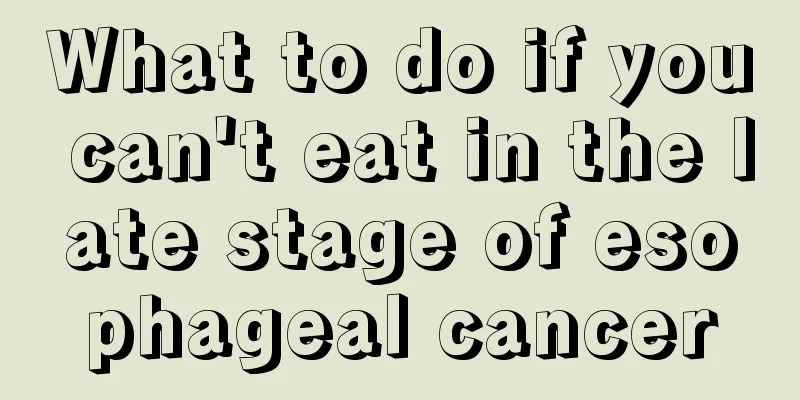What to do if you can't eat in the late stage of esophageal cancer

|
When patients with advanced esophageal cancer are unable to eat normally, they can maintain the energy required by the body through nutritional support therapies such as tube feeding and intravenous nutrition. At the same time, they can actively carry out symptom relief treatments such as dilation and stent placement to improve the quality of life and delay the progression of the disease. 1. Causes of inability to eat: In the late stage of esophageal cancer, food is usually difficult to swallow due to tumor obstruction or compression of the esophagus. Tumor growth may also cause pain or swallowing difficulties, which will significantly affect the patient's ability to eat. If the cancer spreads further, it may also cause serious digestive tract dysfunction, causing the patient to completely lose tolerance for ordinary food. 2Solutions and treatment options: 1 Nutritional support therapy: When the patient is completely unable to take food orally, tube feeding can be performed through a nasogastric tube or gastrostomy, and easily digestible and nutritionally balanced formula drinks, such as medical nutrition powder, can be selected. If the digestive system function is severely impaired, intravenous nutrition and total parenteral nutrition (TPN) are provided through infusion to prevent weight loss and further physical weakness, which is crucial to maintaining the patient's life. 2 Dilatation or stent implantation: Doctors can use esophageal dilatation to temporarily relieve the compression of the tumor on the esophagus and restore some esophageal patency. The patient's ability to swallow liquid or soft food can usually be improved to a certain extent. To improve esophageal patency more permanently, an esophageal stent can also be placed through endoscopic operation to support the compressed esophageal cavity. 3. Pain and symptomatic treatment: The pain caused by esophageal tumors may further hinder the patient's eating. Painkillers such as opioids and psychological counseling can help relieve physical and psychological pain, thereby reducing obstacles to the eating process. In addition, gastrokinetic drugs or antacids can be used to relieve accompanying digestive symptoms such as nausea, acid reflux, and bloating. 3. Improve the quality of life: During treatment, patients should also be provided with psychological support and warm companionship to ensure that nutritional therapy can be continued, and the treatment plan should be optimized under the guidance of doctors. There is currently no cure for advanced esophageal cancer, but careful nutritional support and effective symptom management can delay disease progression and improve patient comfort to the greatest extent. If patients with advanced esophageal cancer experience swallowing difficulties, they must receive timely evaluation from professional doctors and develop individualized treatment plans. Family care should pay attention to the patient's psychological state and actively cooperate with professional nutritional support and treatment measures, which will help maintain the quality of life and prolong survival time as much as possible. |
<<: Early manifestations of uterine cancer at the age of 12
Recommend
Be alert to early symptoms of oral cancer
Oral cancer is a malignant tumor. The characteris...
The abdomen is swollen and hard
Generally, people's stomach and abdomen look ...
Is the non-raised black spot a mole?
Generally speaking, non-raised black spots are al...
What is the reason for dizziness when getting up in the morning
Many people have experienced dizziness, especiall...
What are the symptoms of nasopharyngeal cancer
What are the symptoms of nasopharyngeal cancer? T...
What is the normal heart rate for an adult
We often go to the hospital for physical examinat...
Can leek juice treat urticaria?
People suffering from urticaria generally have sy...
Is it poisonous to grow bean sprouts yourself
If you make bean sprouts yourself, no toxic subst...
What are the acupuncture points for defecation
Nowadays, people's pace of life is accelerati...
The following are the late symptoms of cardia cancer
As more and more patients with cardia cancer are ...
How to make the roughness on the face smooth
Many people want to have delicate and smooth skin...
Early symptoms of esophageal cancer
Esophageal cancer is a serious malignant tumor of...
What causes a swollen face due to inflammation?
Maybe it’s because they haven’t been drinking eno...
What are the treatments for canine distemper?
Canine distemper is a disease that mainly occurs ...
What is the structure of the spinal cord?
The human spinal cord can develop many diseases, ...









